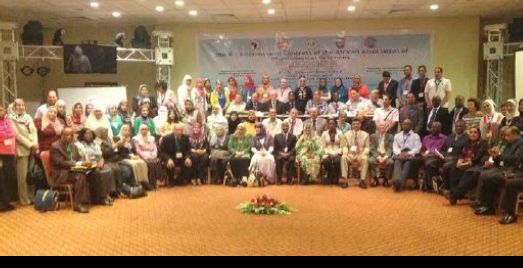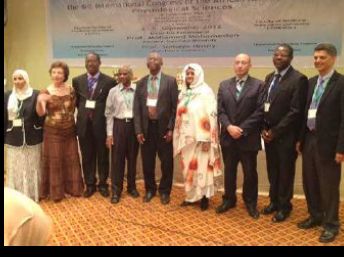
Physiology News Magazine
Physiology in Africa
Scientific research in African nations has to cope with a massive dearth of resources and a climate of poverty. But, led by The African Association of Physiological Sciences, the discipline of physiology is coming together across this vast and diverse continent to confront these challenges.
Features
Physiology in Africa
Scientific research in African nations has to cope with a massive dearth of resources and a climate of poverty. But, led by The African Association of Physiological Sciences, the discipline of physiology is coming together across this vast and diverse continent to confront these challenges.
Features
Amal M Saeed
President, African Association of Physiological Sciences (AAPS) University of Khartoum, Sudan
Anthony B Ebeigbe
Editor-in-chief, Journal of African Association of Physiological Sciences (JAAPS)
University of Benin, Benin City, Nigeria
https://doi.org/10.36866/pn.91.22
The beginning of physiology as a discipline in Africa dates back to the 19th century. The early history of Africa is characterized by colonialism, and the educational system of each colony reflected the political attitude and educational system of the imperial power. From about 1960 various African countries became independent and the tertiary educational systems developed according to the country’s national character.
Physiology in Africa seems to have started in each country at the medical schools. The growth of physiology and interaction amongst physiologists was along the line of regional associations. In recent years, efforts at integrating the various regional/national societies of physiology have been encouraging. The African Association of Physiological Sciences (AAPS) was founded in 1989 and since then collaboration between African physiologists has escalated. A short review of the historical development of physiology in Africa and key achievements by African physiologists are presented in this article.
In the nineteenth century the first department of physiology in Africa was established within the Kasr El-Aini School of Medicine of Egypt. This department was chaired by a number of pioneers, among whom were the Egyptian Professor Abd El-Rahman El-Herrawi and the well-known Russian physiologist Gleb von Anrep. Today in Egypt, there are 21 departments in public and two in private schools of medicine. All departments in the public schools have graduate programmes of physiology, and they have teaching and research laboratories with different research interests. In addition, there are medical physiology departments exclusively for research purposes in the national research institute in Giza and the medical research institute in Alexandria.
In Sudan the first medical school was inaugurated in 1924 as the Kitchener School of Medicine. The physiology department was established in 1951 to cater for both physiology and biochemistry. The main objectives of the department were to take care of teaching physiology to undergraduate students and to conduct research relevant to the needs of the country. In 1956, the school was affiliated to Khartoum University College to form the University of Khartoum. The department shouldered the responsibility for training physiologists and the first Sudanese head of department was appointed in 1962.
The teaching of physiology in West Africa started with the establishment of the first medical school in Nigeria in 1948, at the University College in Ibadan, a college of the University of London. The physiology department included John Grayson and John Parrat, and, later, the first Nigerian, Felix Dosekun, who joined in 1959 before moving to the new department of physiology at the University of Lagos in 1962.
Physiology teaching differs across African countries. In some countries it is a function of the medical schools and in others it is aligned with science faculties. In Egypt, physiology is taught mostly in the first two years of the medical programmes through system-based modules that are either not integrated or have a limited number of integrated learning activities with other disciplines. In the Suez Canal University, it is integrated with other disciplines in a problem-based curriculum, and is taught in the first three years of the programme. Despite the difference in teaching methods, the learning outcomes and the knowledge content are nearly the same.
Research is mainly directed at the health needs of each specific country and in particular the endemic diseases. In Sudan, where goitre and iodine deficiency is a real problem, it is the research subject for many Sudanese physiologists. Nutrition, nutritional deficiency, diabetes and malaria are common health problems addressed by researchers in different African countries. Neurophysiology, cardiovascular diseases and the efficacy of indigenous medicinal plants are also research topics of great interest to African researchers.
Each country has at least one physiologist who inspired the younger generation to love the subject. In South Africa, Cyril Wyndham had an ‘infectious addiction’ to research and he guided his students and colleagues through the challenges and into the excitement and fun of experimentation. He graduated from the Medical School of the University of the Witwatersrand in 1940. The intervention of the world war and encouragement from his colleagues led him to study at Oxford University. At Oxford, the legendary Sir Wilfred le Gros Clark set him in the direction of applied physiology. On his return to South Africa, he set up what was to become the famous Human Sciences Laboratory of the Chamber of Mines Research Organisation. Through his work on the physiological problems faced by the miners, Wyndham became the leading international expert on human thermal physiology. By 1975, he had published over 250 papers on applied physiology, and launched the careers of numerous young scientists – ten of his protégés were later to hold chairs at universities in South Africa and overseas. In remembrance of a brilliant scientist, and of his contribution to thermal physiology, the Physiology Society of Southern Africa set up the Wyndham award. This is given to a young scientist at its annual congresses. Don Craib (South Africa) formulated the ‘doublet’ hypothesis as the origin of electrical signals in heart muscle. Although his work caused a rift amongst his colleagues at the time, he was totally vindicated in 1976. Craib’s dedicated research helped to lay a strong foundation for electrophysiology in this developing country.

Physiology societies in the different African countries bring physiologists together on an annual basis. The Physiological Society of Nigeria (PSN) was established in 1978 and has regularly held annual conferences, with the 32nd such conference taking place in Calabar in August 2012. It also publishes the Nigerian Journal of Physiological Sciences (since 1983), which is now indexed in MedLine/PubMed with two issues published in June and December every year. The PSN continues to be an affiliate of the IUPS, the current President is E E Osim, while Frank Mojiminiyi is on the Teaching Council of the IUPS. Physiology has been growing in West Africa, with about 40 departments in various countries in the sub-region; including the Francophone countries of Ivory Coast, Senegal, Benin and Togo. The Sudanese Physiological Society was formed in 1996 with just 35 members. Now the association has about 125 members. Its main objectives are to promote physiological sciences and to create a base for the collaboration of research among local and international colleagues. The Egyptian Society of Physiological Sciences was established through the efforts of a number of senior physiologists, headed by Ibtessam Elbagoury about 15 years ago. In South Africa the Physiology and Pharmacology Society organised joint annual meetings from 1974 till 1987, after which both societies were strong enough to organise independent meetings.
The African Association of Physiological Sciences (AAPS) was established in Kuopio, Finland on 8 July 1989 with an overall objective of encouraging the training of a new generation of basic medical scientists for the second millennium, equipped with the wherewithal to teach and evolve relevant research to handle Africa’s medical issues and to support the acquisition of basic as well as advanced facilities and equipment to ensure proper teaching and research. The founding of AAPS was pioneered by 35 physiologists from 15 countries in Africa that attended the centennial Kuopio IUPS congress under the guidance of Osmo Hanninen (Finland) and Kayode Adeniyi (Nigeria), who served as Secretary General. The first congress of AAPS was held in Nairobi, Kenya, in 1992, with over 300 participants from 30 countries in Africa, Europe, Asia and the USA, as well as key officials of the IUPS and American Physiological Society (APS). AAPS is as a non-profit organization registered in South Africa, a member of IUPS and is affiliated to the International Society for Pathophysiology. It has facilitated the establishment of a number of national societies of Physiology in Africa, including: The Sudanese Physiological Society, The Zimbabwe Physiological Society, and The Ethiopian Physiological Society. AAPS holds its International Congress in the year preceding the IUPS congress. Five other congresses have been held as follows: Durban, South Africa (1997); Pretoria, South Africa (2001); Tetouan/Tangiers, Morocco (2004); Nairobi, Kenya (2008); and Ismailia, Egypt, (2012). The 7th International Congress will be held in Nigeria in 2016. The current president of AAPS is Amal Saeed of the University of Khartoum, Sudan.


The number of physiologists and physiology research activities in Africa are growing. The congresses of the AAPS enable physiologists from Africa to get together and form collaborations to address common research topics. These conferences are also attended by physiologists from first-world countries who give inspirational ideas to AAPS members. The biggest challenges African Physiologists face are funding problems, since the governments have limited budgets and therefore little national support is given to tertiary research and teaching. Researchers have difficulty obtaining advanced research facilities and equipment and therefore cannot develop cutting-edge expertise. Due to these limitations, promising researchers often leave their countries for those where better research facilities and research grants are available. Many African countries do not have a well-developed telecommunication system and hence communications and access to the internet limit scientists and students who wish to be internationally competitive.
